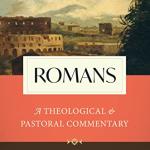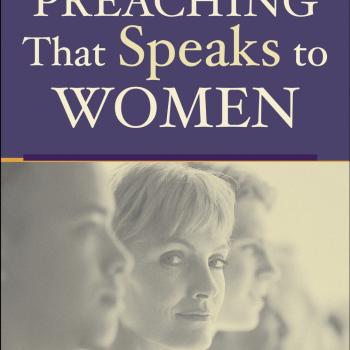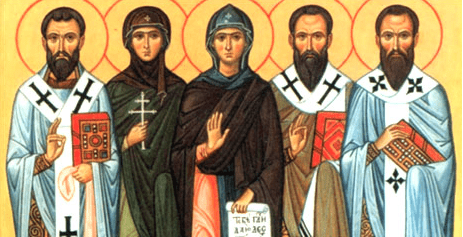
Over the weekend a certain tweet about single women made the rounds, gathering eye-rolls and gag reflexes with every RT and QT it earned. The great wisdom of this particular theobro* centered on the choice of single women to forego marriage and children. Read for yourself.
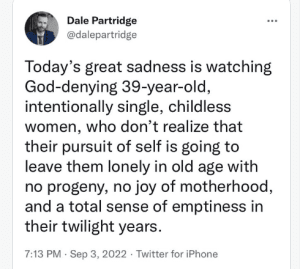
Let’s pour a vat of salt on Dale’s words here and assume he wasn’t trying to insult single women. I know, I know. To paraphrase: Women who choose singleness, and therefore childlessness, are selfish and setting themselves up for a cold, lonely old age.
Nice.
Does he realize that more women attend college than men? Education sets up men and women for futures where they can make a decent wage and save for retirement. Does he think single women have no families or friends? Does he assume that grown children will automatically care for their aging parents?
Or does he believe that God calls women primarily to marry and have children as a means of growing the church? Does he believe that choosing to remain single is denying God’s design? What about 1 Corinthians 7:8? “Now to the unmarried and the widows I say: It is good for them to stay unmarried, as I do.”
Again, Twitter:
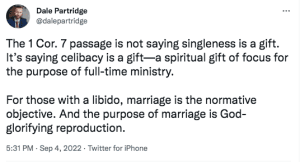
Hmm, that’s a new way to interpret Paul. Dale has an answer for everything, it seems. But his shallow theology can’t see past his limited view of male headship and the masculine virtues he thinks the church ought to reflect. How would his view of single women hold up against history and the Bible itself?
Biblical Priorities Regarding Children
In Luke 2, we are introduced to Anna, a widow:
There was also a prophet, Anna, the daughter of Penuel, of the tribe of Asher. She was very old; she had lived with her husband seven years after her marriage, and then was a widow until she was eighty-four. She never left the temple but worshiped night and day, fasting and praying. Coming up to them [Joseph and Mary] at that very moment, she gave thanks to God and spoke about the child to all who were looking forward to the redemption of Jerusalem. (2:36–38)
As a widow, Anna once had the potential for children. And she could have remarried. But when her husband died she chose to remain a widow and live out her days in service to God as a prophet in the Temple. It had been a few generations—400 years—since God had spoken to his people through a prophet, and here we see the first mention of his active word being revealed once again to his people, this time through a woman who had dedicated her life to him as a single woman. She focused her ministry on the coming Child, rather than any children of her own.
Jesus, himself single and childless, spoke approvingly of those who chose a life of singleness for his sake:
Matthew 19:12 “there are those who choose to live like eunuchs for the sake of the kingdom of heaven.” To live like a eunuch—set aside your libido and choose celibacy.
Matthew 19:29 “And everyone who has left houses or brothers or sisters or father or mother or wife or children or fields for my sake will receive a hundred times as much and will inherit eternal life.”
Not only is singleness approved, but Jesus also warns that sometimes his followers must choose their first loyalty—family or Kingdom. Early saints took his words to heart. During the persecutions of the first–third centuries, parents were sometimes forced to choose between their families and their Lord.
How the Church Redefined Family
My subheading may be a tad ambitious—I don’t have time to give you a comprehensive history of the early church’s subversive teachings against Roman customs. But a few stories will help round out our understanding of what motivated believers to reject the traditional family in favor of sometimes staying single or dying for their faith.
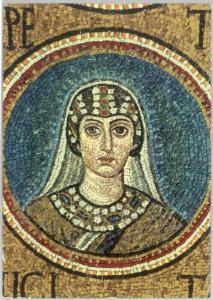
Roman culture prioritized the family above all else, for a healthy family produced children who would grow up to serve the empire and continue the emperor’s good fortune. Children were expected to honor their parents throughout their lifetimes, even after they married. For a grown daughter to refuse marriage was scandalous. But as it grew and spread, the church offered believers—who would be rejected and/or persecuted for their Christian faith—a new family to love and support each other.
Perpetua was a young woman born around 180 AD into a wealthy Roman family. Her mother was a Christian, her father a pagan. When we meet her, she’s been arrested for refusing to deny her Christian faith. Her father pleads with her to think of him and what she owes him in his old age, but she’s committed to Jesus. Even the idea of leaving behind her young son, still nursing, cannot dissuade her from her course.
A mother choosing Jesus over her child? Scandalous!

Fast forward to the 4th century, where we meet Macrina, the older sister of two Cappadocian bishops, Basil of Caesarea and Gregory of Nyssa, as well as another bishop, Peter of Sebaste. Her fiancé, betrothed to her from a very young age, died before they married. She successfully argued to her father that she should not have to marry since the resurrection life meant that he lived, so they were still betrothed. Her clever argument revealed a sharp mind and a devotion to Christ that persisted through her long life.
Macrina chose a life of perpetual virginity and became the leading influence on her brothers’ intellectual, philosophical, and theological education. She founded a monastery for women, educating them as well, and worked in her community to establish effective ways to serve the poor. In denying herself the comforts of a typical Roman life, she “leaned in” to God’s call to serve him in a specific, sacrificial way.
Though she never had children, Macrina mothered some of the greatest theological minds of her time.
History matters.
Some early Christian women renounced marriage and children for the cause of Christ. Unbelieving family members understandably objected to their choices, but the church celebrated them. Why do church leaders (cough, Dale) now seek to make marriage and motherhood the greatest calling women can ever know?
The Bible matters.
In Genesis 1, God commissions the first couple to “fill the earth and subdue it” (1:28). Procreation was a necessary component to filling the earth at that time. Jesus gave a new, great commission before he ascended: “Go and make disciples of all nations…” (Matt 28:19). The church grows via disciples, not just children. Every person, single or married, can and should participate in the disciple-making mission of the church.
My friend JoAnn Hummel, also single, has ministered to and mentored countless men and women over the years in her role as a pastor. Her response?

Let’s pursue not the approval of men but that of Jesus, our beautiful Savior, brother, friend.
*self-righteous, mansplaining male theologian wannabes
Cover image: The Cappadocian greats: Macrina flanked by siblings Peter, Gregory, Basil, and Theosebia. https://www.swordofthespirit.net/bulwark/february2018p19.htm

